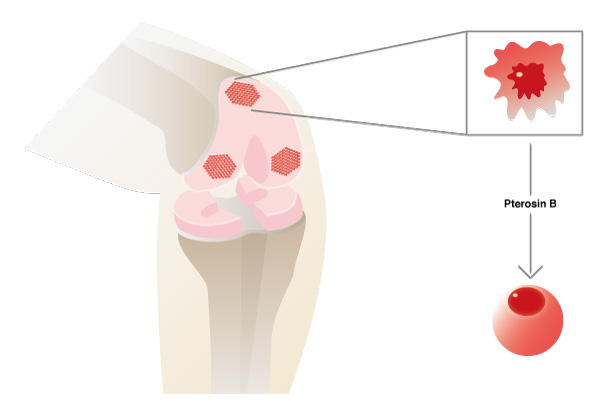
News & Events
News & Events
News
March 25, 2016
New candidate compound for treating osteoarthritis

Osteoarthritis is the most common form of arthritis and inflicts more than 15% of people over 60 years of age. Most therapies only treat the symptoms, thus the disease progressively worsens in most patients. The reason is that although phenotypically osteoarthritis is described by a loss of articular cartilage, little is known about the molecular mechanisms that lead to this disease. Professor Noriyuki Tsumaki and his lab, which specializes in the study of cartilage, however, now report a new compound, pterosin B, that shows promise for halting the disease progression. The report can be found in Nature Communications.
Chondrocytes are the cells that make up articular cartilage. Articular cartilage can be divided into two zones, non-calcified and calcified zones. In healthy articular cartilage, only the chondrocytes in the calcified zone show hypertrophy, but in osteoarthritic articular cartilage, chondrocytes from both zones do. Tsumaki and his team wondered whether preventing the hypertrophy program could be a therapeutic measure to counter osteoarthritis. "There are many questions about what causes osteoarthritis," said Tsumaki. "We are considering abnormal chondrocyte homeostasis as a major factor."
The lab had previously reported a mouse model which indicated that the molecule Sik3 has an important role in activating hypertrophy. In their latest publication, the team reports pterosin B, a compound found in certain types of fern, can inhibit Sik3 to prevent hypertrophy. The effects of pterosin B were tested in a mouse model of osteoarthritis and also in cartilage generated from human induced pluripotent stem (iPS) cells, which are cells reprogrammed into a stem cell state.
Currently, there remains no effective treatment to stop the progression of or reverse osteoarthritis. While their findings about Sik3 and pterosin B do not suggest a remedy for patients already suffering from severe arthritis, it does reveal a new strategy for stabilizing the disease and, in cases of early detection, preventing serious debilitation. "This gives us hope for a drug that targets the disease and not the symptoms," said Dr. Yasuhito Yahara, first author of the study.
Paper Details
- Journal: Nature Communications
- Title: Pterosin B prevents chondrocyte hypertrophy and osteoarthritis in mice by inhibiting Sik3
- Authors: Yasuhito Yahara1,2, Hiroshi Takemori3, Minoru Okada1, Azuma Kosai1, Akihiro Yamashita1, Tomohito Kobayashi1, Kaori Fujita1, Yumi Itoh3, Masahiro Nakamura4, Hiroyuki Fuchino5, Nobuo Kawahara5, Naoshi Fukui6, Akira Watanabe4, Tomoatsu Kimura2, Noriyuki Tsumaki1
- Author Affiliations:
- Department of Cell Growth and Differentiation, Center for iPS Cell Research and Application (CiRA), Kyoto University, Kyoto, Japan
- Department of Orthopaedic Surgery, Faculty of Medicine, University of Toyama, Sugitani, Toyama, Japan
- Laboratory of Cell Signaling and Metabolic Disease, National Institutes of Biomedical Innovation, Ibaraki, Osaka, Japan
- Genome/Epigenome Analysis Core Facility, Center for iPS Cell Research and Application (CiRA), Kyoto University, Kyoto, Japan
- Research Center for Medicinal Plant Resources, National Institutes of Biomedical Innovation, Tsukuba, Ibaraki, Japan
- Graduate School of Arts and Sciences, Department of Life Sciences, University of Tokyo, Tokyo, Japan






















